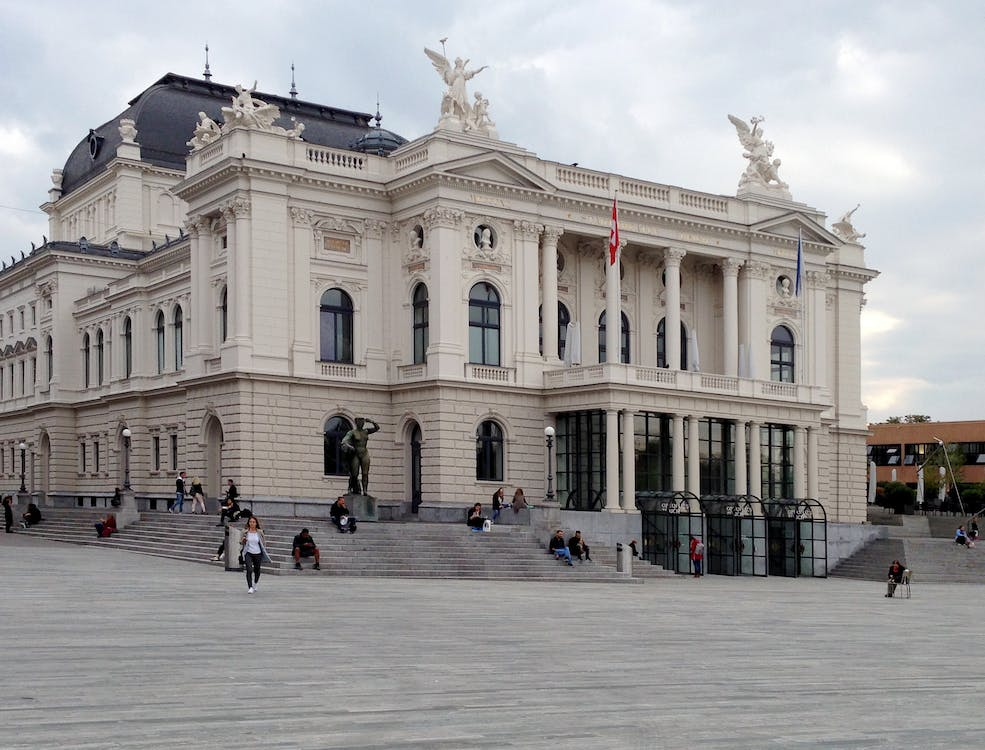
Apply to a foreign university with confidence
- Properly fulfilled documents
- Perfect motivation letter
- Support from a personal mentor
- Offers from several universities
Article score: 5 out of 5 (2 reviews)
High quality education in Switzerland will coast you a pretty penny. Let's figure out its pros, cons and learn how to enter a Swiss university and successfully graduate.
Free consultation




Compulsory education in Switzerland starts at primary school (Primarschule). In most cantons this stage includes a kindergarten (Kindergarten) lasting 1-2 years, to which children of ages 5-6 are taken. At the age of 11-12, students transfer to secondary schools (Sekundarschule I). By the standards of the state curriculum, secondary school graduates are required to speak three languages: two national languages to choose from and English. At the age of 15, students transition to high school (Sekundarschule II), and are divided into 3 educational tracks. Exam results, recommendations of teachers, and opinions of parents are taken into account. The student can continue their studies in:
Education in Switzerland is associated with prestige and elitism. Thanks to public and private investments, the country is a leading center for scientific research, in which students are involved from the first years of study at the university. A Swiss diploma is a seal of quality for an employer in any country in the world, and studying here is not always as expensive as many assume.
| Type of study | Age | Duration | Min. cost | Avg. cost | Language requirements |
|---|---|---|---|---|---|
| Summer camp | 6+ | 1-4 weeks | 1,827 USD/week | 3,046 USD/week | A1 |
| Language courses | 12+ | 1-12 weeks | 2,436 USD/week | 3,655 USD/week | A1 |
| Secondary education | 6+ | 6-13 years | Free | 60,911 USD/year | B1 |
| Foundation | 17+ | 1-2 semesters | 2,071 USD/year | 4,873 USD/year | B1 |
| Bachelor's | 18+ | 3-4 years | 853 USD/year | 18,273 USD/year | Test DAF 4 / DELF / CELI B2 / IELTS 6.0 |
| Master's | 20+ | 2 years | 853 USD/year | 9,746 USD/year | Test DAF 4 / DELF / CELI C1 / IELTS 6.0 |
| MBA | 20+ | 1-1.5 years | 25000 СHF/year | 50000 СHF/year | IELTS 6.5 |
| Doctoral | 20+ | 3 years | 100 СHF/year | 2000 СHF/year | Test DAF 4 / DELF / CELIitem C1 / IELTS 6.5 |
Some Swiss universities offer applicants to take pre-Bachelor and pre-Master training programs. Such year long courses are usually aimed at studying the language and/or complex mathematics or other professional disciplines, but do not guarantee further admission to the university. In private universities, a Foundation Year is sometimes a mandatory part of the curriculum for foreigners. If you show a high level of knowledge during the entrance exams, you can shorten the duration of your studies by skipping the preparatory year.
Perhaps the best preparation for a Swiss university would be passing one of the international high school programs:
Some of them are taught in large cities around the world. Having one of the above certificates will greatly simplify admission and adaptation to a Swiss university.

Colleges of secondary and higher vocational education in Switzerland (Berufsbildung) are practically inaccessible to foreigners. To enter there, you must have good reasons for moving, living and working in the country[1]. Colleges train specialists for blue-collar occupations most in demand in the labor market, as well as offer advanced training (Swiss Federal PET Diploma Examinations). First of all, such programs are designed for local residents in order to raise the level of education and reduce unemployment.
The title college in Switzerland is also used for prestigious private schools, where children from all over the world receive an elite secondary education. From the age of 16, you can enter the high school level program in order to receive the Swiss, British or American equivalent of the certificate (A-level, and etc.). This will allow you to freely enroll in universities in Switzerland and almost any country in the world, but it will cost at least 48,728 USD per year.
Bachelor's degree in Switzerland is the first cycle in the traditional Bologna system. After completing the program, the student earns 180 ECTS. Is it possible to study full-time (3 years) or combine studies with work or caring for a small child — part-time (4 years). The language of instruction depends on the canton in which the university is located: German, French or Italian. A relatively small number of courses are taught in English, if it is not a private university.
Typically, students have compulsory subjects in their specialisation (major), additional qualifications in another field of choice (minor) and free electives. The last year of studies is usually dedicated to writing a thesis: not only the theoretical component is important, but also the practical application of the research done.

Master's degree in Switzerland lasts for 1-2 years, depending on the specialty and allows you to earn 90-120 ECTS credits. At this cycle, the choice of English-language programs is much wider compared to the bachelor's cycle, but in most cases, knowledge of one of the state languages is still required. The only exceptions are private universities and MBAs. The main condition for admission is a bachelor's degree in the same or related specialty.
Each university can set its own admission requirements when it comes to the previous education of the future master’s students. Traditional universities in most cases do not accept bachelor's graduates of the universities of applied sciences (UAS) into their master's programs, but some make exceptions for certain faculties. UAS, in turn, may require experience in your field. In universities of this type, studies are often combined with compulsory internships at companies.
Salaries in Switzerland increase in proportion to the level of education, for that reason, not only those who wish to get a PhD and build an academic career apply to master’s programs.
In Switzerland, only traditional universities (Université / Universität) are eligible to award PhD degrees, and there are only 12 such institutions in the country. For admission to doctoral studies, you must provide a master’s degree in a related specialty from an accredited university, Research Proposal, and a language certificate or other confirmation of language proficiency. The duration of study including the writing of a doctoral dissertation is at least 3 years, maximum 8 years. However, it is worth remembering that the period of study for foreigners in Switzerland cannot exceed 8 years in total, taking into account all levels of education.
Some universities offer PhD students to take a field of study from the proposed list, and some give complete freedom in choosing a topic. Many doctoral students combine dissertation writing with work in junior academic positions.
Academic positions in Switzerland differ somewhat from the most common American equivalents. There are two career paths in the country, depending on which canton the educational institution is located in. Switzerland has the highest academic salaries in the world[2]. The most common career scheme is described below.

International students from any country are eligible to work a maximum of 15 hours per week. Additional limitation is applicable to non-EU/EFTA students: they can work only starting from the second semester, that is, 6 months after the beginning of study. Master’s students in some cantons are allowed to not wait for six months. During the holidays, you can work full-time (40 hours per week).
EU/EFTA nationals may need to apply for a work permit if their employment exceeds 90 days. Students from other countries must have both a Residence Permit and a work permit in any case. The employer will take care of the latter by submitting an application to the Office of Economics and Labor (Amt für Wirtschaft und Arbeit) of the respective canton.
Life in Switzerland is very expensive, so most students try to find a part-time job. Without higher education, it will be possible to get only an unskilled position (salesman, waiter, etc.), but this also guarantees a minimum wage of 2,436-3,655 USD, which can cover room rent and meals. Also, many universities offer work on campus: in a student cafe, library or a gym.
After graduating from a Swiss university, citizens of non-EU countries can obtain a Category B work permit, which renews their Residence Permit once for 6 months in order to find work. To do this, you must provide a graduation diploma from a local university, as well as proof of housing and funds. During this period, the applicant can work no more than 15 hours per week.
It can be difficult for third country nationals to find work in Switzerland. As in many European countries, preference is given to local applicants and those from the EU. In addition, your specialty should be in high demand in the labor market at the moment.
In Switzerland, the unemployment rate among foreigners is 2 times higher than among locals — 7.5% versus 3.5%[3]. If you manage to overcome difficulties and find a job, you can get a residence permit, and after 12 years of permanent residence in the country, you can apply for citizenship.

Switzerland. The competition in Switzerland is very high. This is especially true for regulated specialties like medicine. When hiring a foreign candidate, the employer must first choose from among the EU citizens, so the odds are not in favour of job seekers from other countries.
Europe. Swiss education is considered one of the best in Europe in the fields of engineering, IT, management and hospitality. A Swiss diploma will impress many companies in the EU. Often, students receive job offers during their internships.
Academic career. In Swiss universities, most of the teaching staff are foreigners not only from Europe, but also from all over the world. For example, in ETH their share is 75%[4]. For employment it is important to be fluent in one of the state languages. A candidate over 35 will most likely be rejected, since universities prefer to independently raise successful academics from young scientists.
60+ countries
we work with
$1,000,000 saved
by students through scholarships
6,400 offers
our students got